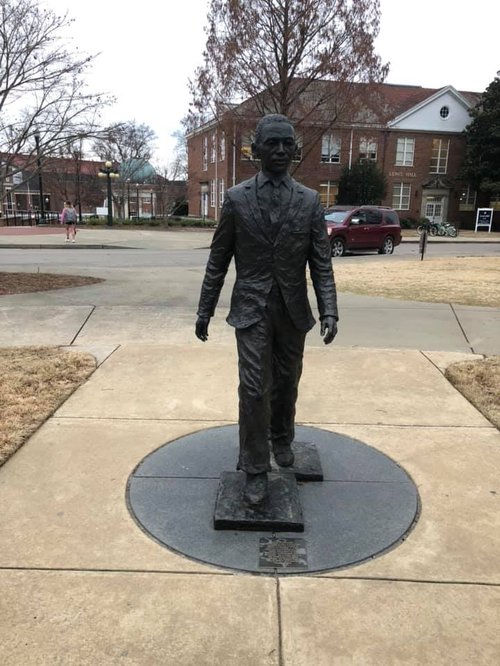Student Work
James Meredith, James McShane, and John Doar walking through campus, October 1, 1962
James Meredith’s Duty to Mississippi
By: Jasmine Walker
James Howard Meredith was born in Kosciusko, Mississippi on June 25, 1933. He recalled, “I had left this land—God’s country claimed by the white Mississippian as his ‘heaven on earth,'” in August 1950, spent one year at Florida high school, and served nine years in the United States Air force.[1] “I am a soldier at heart, and I suppose I always will be. If there is anything that I ever wanted to be, in guess it would have been a general. But let’s begin our drive into Mississippi.” Meredith had two significant things that he wanted to do in life. Those two things were to run for governor of Mississippi and get a degree from the University of Mississippi. He never wanted to be elected as governor, he just wanted to get vote from every African American in Mississippi. “I was firmly convinced,” Meredith wrote, “that only a power struggle between the state and the federal government could make it possible for me or anyone else to successfully go through the necessary procedures to gain admission to the University of Mississippi”.[2] Meredith knew the process of admission into the University of Mississippi was not going to be an easy process. In the words of Meredith, “I considered myself an active duty soldier. I was at war, and everything I did I considered an act of war”.[3] James Meredith admission into the University of Mississippi was denied of May 25, 1961. On May 30th, Mrs. Constance Motley (Meredith’s lawyer) filed a lawsuit after Meredith was denied admission into the University of Mississippi because he was black. Commotion began because Mrs. Motley was not a lawyer from the state and it was stated that in order to pursue a lawsuit, Meredith had to have a lawyer from Mississippi. No lawyer was willing to take this case besides R. Jess Brown.“We found a place to park and walked about two blocks to the court building. There was a long flight of steps leading up to the entrance. We must have looked strange and conspicuous going up to the proper floor of Judge Mize’s courtroom, where we encountered a guard or a clerk who took the message into the judge’s office. In a very short time we were led into courtroom and given seats. I believe there was some case being heard dealing with large-scale embezzlement. I know it was a hotly contested case and tempers were running high. Finally Judge Mize interrupted this case to hear Mrs. Motley’s plea. The case was now in the hands of the federal court—the Mississippi federal court.”[4]
Finally decision was made on Meredith’s birthday, June 25, 1962, and the U.S. Fifth Circuit Court of appeals rule James Meredith admitted to the University of Mississippi. September 30th, 1962, segregationists began protesting the enrollment of James Meredith, which led to an extremely violent riot that continued until the next day, October 1st, which is the arrival date of James Meredith. “The crisis was one of those pivotal events that galvanized public opinion against segregation and made it easier for Martin Luther King and other Civil Rights Act of 1964 and the Voting Rights Act of 1965”.[5] On the first of October, Meredith became the first African American man to enroll at the University of Mississippi. “My exit from Mississippi on August 18, 1963, marked the end of my three years in the state; it marked the end of this particular stage of my struggle to break the system of “White Supremacy” and to carry out my “Divine Responsibility.”[6] On August 18, 1963, James Meredith graduated from the University of Mississippi, with a degree in political science.

Statue of James Meredith on the University of Mississippi
Photo taken by Author
[1]Meredith, James. Three years in Mississippi. Bloomington: Indiana University Press, 1966. 3.
[2]Meredith, James. Three years in Mississippi. Bloomington: Indiana University Press, 1966. 51.
[3]Doyle, William. An American Insurrection: The Battle of Oxford, Mississippi, 1962. New York: Doubleday. 2001.
[4]Meredith, James. Three years in Mississippi. Bloomington: Indiana University Press, 1966, 107.
[5]Gallagher, Henry T. James Meredith and the Ole Miss Riot: A Soldier’s Story. Jackson: University Press of Mississippi, 2012.
[6]Meredith, James. Three years in Mississippi. Bloomington: Indiana University Press, 1966. 328.
